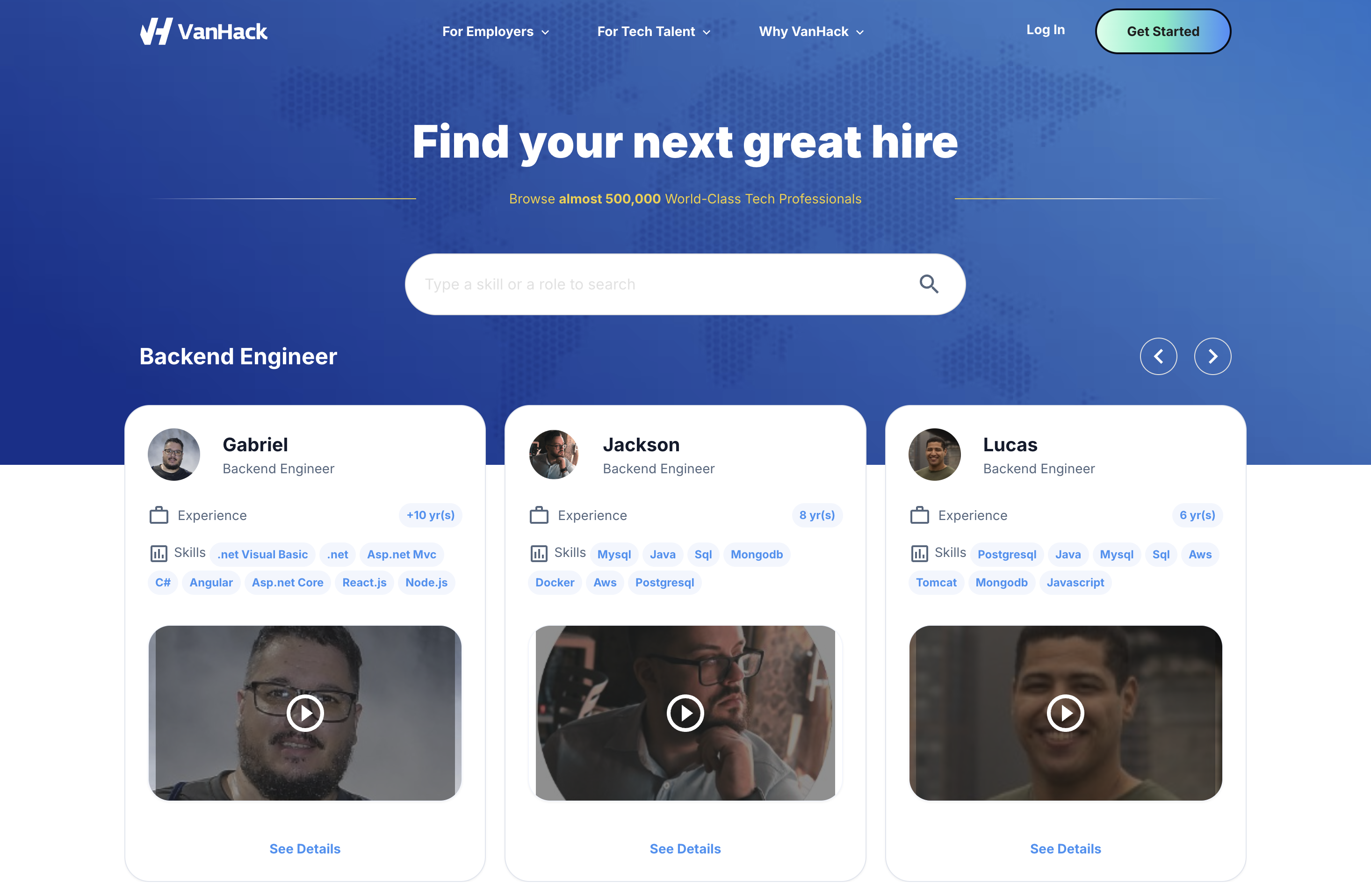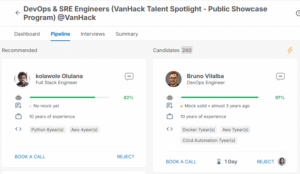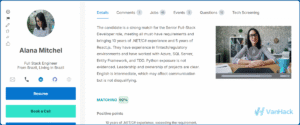Hiring remote developers from Latin America has become a key strategy for US companies looking to build strong tech teams. However, assessing talent across borders comes with unique challenges that traditional methods often fail to address. Skills testing offers a reliable way to evaluate candidates objectively, ensuring you make informed decisions while reducing bias. This guide walks you through practical steps to implement skills testing, analyze results, and align assessments with your hiring goals. Ready to streamline your process? Connect with VanHack to hire faster using proven strategies.
Quick Overview and Key Framework
Hiring remote LATAM developers demands a different mindset compared to local recruiting. Skills testing acts as a vital tool to measure a candidate’s potential against your company’s needs, regardless of location or cultural differences. Focus on three main areas: technical skills through consistent tests, communication abilities for remote teamwork, and cultural fit for lasting success.
Understand key terms like talent acquisition, which focuses on long-term team growth, versus recruiting, which fills immediate roles. Recognize differences in engineering levels such as senior, staff, or principal, each with unique responsibilities. Also, consider how global markets affect compensation, whether through equity or cash. A solid hiring strategy ties these elements to your product goals, funding schedules, and market position.
Understanding the Tech Talent Market
The tech talent landscape includes diverse players, from large corporations to fast-growing startups, consultancies, and talent platforms. Solutions range from executive search firms to specialized agencies and internal team-building efforts. Remote work, AI tools, and rising pay have reshaped competition for LATAM developers.
Older methods like job boards or referrals often fall short for startups needing specific technical skills. New trends emphasize access to global talent, engagement with tech communities, and building a strong employer brand. Data-driven assessments are becoming essential to evaluate candidates fairly across varied backgrounds.
Why Skills Testing Matters for Remote LATAM Hires
Latin America offers a strong pool of tech talent due to its quality education systems and cost-effective rates. Yet, hiring remotely from this region poses challenges that require structured testing to reduce risks and ensure positive results.
Overcoming Language Gaps
English skills are crucial for effective remote collaboration. Testing for language proficiency and cultural understanding ensures candidates can communicate clearly, explain technical ideas, engage in async discussions, and write detailed documentation.
Confirming Technical Expertise
Relying on resumes alone doesn’t reveal true technical ability in remote hiring. Skills tests validate coding skills, problem-solving approaches, and specific tech knowledge. With distance as a factor, thorough early assessments help avoid costly hiring mistakes.
Evaluating Remote Work Readiness
Remote roles demand unique traits like self-discipline, time management, and clear communication. Cultural fit, including work style and value alignment, plays a big role in retention and team output across distributed setups.
Reducing Hiring Bias
Standardized testing with clear criteria for essential and preferred skills cuts down on subjective judgments. This ensures fair evaluations for all candidates, no matter their background or location.
Skipping proper assessments can lead to high turnover, lower productivity, and significant costs. A bad hire in a remote setting may cost over $150,000 when factoring in onboarding, lost output, and replacement expenses.
Key Decisions and Trade-offs
Decide whether to build an in-house testing system or partner with external providers by weighing your team’s hiring expertise against available solutions. Costs include full-time recruiters at $85,000 to $120,000 yearly, executive search fees of 20 to 35% of first-year salary, and the impact of delayed hires in a competitive field.
Consider how hiring strategies shape company culture, team dynamics, and growth pace. Measure returns through time-to-productivity, often 3 to 6 months for senior roles, retention rates targeting 85% or higher in the first year, and improved product delivery speed via sprint and feature timelines.
Track success with 90-day performance reviews, time-to-fill goals of 30 to 45 days for senior positions, offer acceptance rates above 80%, and long-term metrics like code quality and project consistency.
Core Elements of Effective Skills Testing
Consistent Standards
Use uniform criteria for required and desired skills to compare candidates fairly, no matter their background. Consistent frameworks ensure reliable assessments, even with varying interviewer experience.
Varied Assessment Methods
Combine multiple approaches to gain a full picture of a candidate’s potential. Blend technical tests, communication checks, and cultural evaluations to predict success in remote roles.
Real-World Problem Solving
Focus on practical tasks over theoretical questions. Coding challenges and simulations that mimic actual job duties offer better insight into on-the-job performance.
Soft Skills for Remote Roles
Evaluate non-technical abilities like communication, adaptability, and teamwork, which are vital in remote and cross-cultural settings. These traits often determine integration and overall performance.
Detailed Skills Testing Approaches for LATAM Developers
Technical Evaluation Tactics
Coding Tests on Platforms
Use platforms like HackerRank, Codility, or CodeSignal for standardized, automated coding challenges. These tools allow scalable, objective assessments and reduce manual review time.
Job-Like Project Tasks
Assign projects that reflect real work scenarios, such as navigating codebases or debugging issues. This method closely predicts how candidates will handle daily tasks.
Reviewing Code Portfolios
Analyze past work to understand coding style, project handling, and decision-making. Portfolios highlight growth, quality focus, and versatility across project types.
Structured Tech Interviews
Combine live and async interviews using dedicated tools for consistent evaluation. This mix assesses both technical skills and the ability to explain solutions clearly.
Communication and Language Testing
Focused English Checks
Test listening, speaking, writing, and technical vocabulary for remote collaboration. Strong language skills ensure smooth interaction within distributed teams.
Brief Video Introductions
Short videos reveal communication style, confidence, and personality early on. They help assess clarity in expressing ideas without needing full interviews.
Explaining Technical Concepts
Ask candidates to break down complex ideas simply. This tests both expertise and the ability to communicate effectively to varied audiences, a key remote work skill.
Soft Skills and Team Fit
Behavioral Questions
Ask about past remote work scenarios to gauge adaptability and collaboration. Focus on responses that show alignment with team dynamics across cultures.
Personality Assessments
Use standardized tools to uncover work styles and traits suited for remote roles. These provide data on fit and potential for long-term team success.
Ready to hire with confidence? Connect with VanHack for tailored skills testing for remote LATAM developers.
Building Skills Testing into Your Hiring Process
Early Candidate Screening
Start with basic technical and communication tests to filter large applicant pools. Automated tools like coding quizzes and language checks quickly identify unqualified candidates.
In-Depth Technical and Behavioral Reviews
Use layered assessments for a clear view of skills, communication, and cultural alignment. Include detailed coding tasks, structured interviews, and fit evaluations for deeper insights.
Final Decision Validation
Combine all test data, from technical scores to cultural assessments, for a complete candidate profile. Rank candidates based on performance predictors to finalize choices.
How VanHack Simplifies Hiring
VanHack streamlines the process of hiring remote LATAM developers with powerful tools and focused support. Take a look at how their platform works to make hiring easier.

AI-Powered Candidate Matching
VanHack’s AI tool, “Vanna,” scans a pool of over 500,000 professionals to match your job needs. It delivers a shortlist of 3 to 5 pre-vetted candidates, cutting down on manual screening.
Thorough Candidate Vetting
Detailed profiles include video intros, coding test results, and AI-driven interviews. This gives you a full view of each candidate without extensive in-house effort.
Unified Dashboard
Manage everything from one platform with tools for tracking candidates, scheduling, and communication. This setup keeps your team aligned and saves time.
Faster Hiring Cycles
With pre-screened candidates, your team focuses on final interviews instead of initial filtering. This speeds up the journey to hiring the right person.
Making Data-Driven Hiring Choices
Setting Clear Benchmarks
Define specific standards for technical, communication, and cultural assessments. Use past hire data to set minimum scores for consistent evaluations.
Complete Candidate Insights
Blend numerical scores with interview observations for a rounded view. Weigh different factors to predict job success more accurately.
Minimizing Evaluation Bias
Use structured methods, diverse interviewers, and blind reviews to keep assessments fair. Focus on job-related skills, not personal impressions.
Refining Your Approach
Regularly update testing methods based on hire performance and feedback. Track outcomes and adjust processes to improve results over time.
Tips for Better Skills Testing
Align tests with actual job duties for relevant results. Ensure assessments reflect thereal challenges candidates will face, especially in remote setups.
Keep candidates engaged with clear communication, prompt feedback, and respectful interactions. A positive experience boosts acceptance rates and your brand.
Update testing tools and questions to match current tech trends and standards. Review content and scoring regularly to stay effective.
Use automation for scoring, scheduling, and communication to save time. Automated systems ensure consistency without sacrificing quality.
Adopting Today’s Best Hiring Practices
Leading companies partner with specialized platforms to access pre-vetted global talent. Traditional job boards and internal teams may not have the tools or expertise for international remote hiring.
Current benchmarks favor data-focused testing that combines technical, communication, and cultural checks. Firms using structured methods often see better retention and faster onboarding.
Innovative tools like AI assessments and integrated platforms provide deep candidate insights with less effort. These solutions maintain evaluation quality while saving time.
Partnering with platforms offers access to unique talent pools, including passive candidates and international pros. This gives a competitive edge over general recruiting channels.
What Sets VanHack Apart for LATAM Hiring
Top-Notch Candidate Screening
Video First Impressions
Short videos highlight communication skills and personality early. This quick check saves time before diving into full interviews.
Objective Tech Testing
Integrated coding results offer clear data on technical ability with scores and benchmarks. All details are accessible in candidate profiles.
AI-Driven Interviews
Recorded 30-minute sessions with an AI interviewer show problem-solving and communication skills. Videos, transcripts, and scores provide detailed insights without heavy team involvement.
“Vanna” – Your AI Hiring Assistant
VanHack’s subscription service, “Vanna,” costs $3,000 monthly for unlimited hires. This flat rate saves money compared to per-hire fees, ideal for scaling teams.
With access to over 500,000 professionals, quality remains high. AI delivers tailored shortlists of 3 to 5 candidates per role.
Support for Global Relocation
VanHack includes visa help, housing, and school search for relocation hires at no extra cost. This eases the complexity of international moves.
Looking for skilled developers? Connect with VanHack to find top talent through specialized testing for LATAM hires.
VanHack Compared to Other Hiring Methods
|
Assessment Aspect |
Traditional Methods |
Generic Platforms |
VanHack Solution |
|
Technical Validation |
Manual coding challenges, subjective interviews |
Basic online tests, self-reported skills |
AI interviews, integrated coding tests, objective scoring |
|
Communication Assessment |
Ad-hoc during interviews |
Resume review only |
Video introductions, AI interview transcripts |
|
Bias Mitigation |
High risk, unstructured |
Subjective recruiter screening |
Standardized AI-assisted evaluation |
|
Time Investment |
Significant screening time |
High volume, low quality |
Pre-vetted shortlists, minimal screening |
Preparing to Implement Skills Testing
Assess your current hiring setup, processes, and alignment with business goals. Evaluate your team’s skills, tech tools, and budget for talent acquisition.
Identify key players like decision-makers and technical leads who’ll be involved. Gain support from engineering, HR, and leadership for successful execution.
Prioritize roles based on impact and urgency, focusing first on critical positions like senior developers or technical leads for thorough testing.
Weigh internal strengths against the need for external help based on hiring volume and expertise gaps. Decide if your team can handle remote challenges or needs support.
Align hiring timelines with product goals, funding, and market needs. Coordinate talent acquisition with growth plans for maximum effect.
Common Mistakes to Avoid
Sticking to local hiring methods can fail in remote international contexts. Adapt approaches to address cultural and time zone differences.
Ignoring cultural fit often leads to turnover and team issues. Technical skills alone don’t ensure success in remote setups where alignment matters.
Overlooking English skills can disrupt team communication and output. Language ability is key for remote roles requiring clear interaction.
Lack of standard processes creates uneven candidate experiences. Informal methods suited for local hires don’t scale for global talent.
Failing to plan onboarding for remote hires risks early turnover. Structured programs for tools, culture, and integration are essential.
Common Questions on Skills Testing for LATAM Talent
Ensuring Fair Skills Testing Across Cultures
Use standardized criteria and varied methods to limit cultural bias. Focus on job-specific skills with tools like automated coding tests and AI interviews. Add structured behavioral questions for remote skills and use diverse panels for fairness.
Key Non-Technical Skills to Test
Prioritize English proficiency, adaptability to time zones, clear async communication, time management, and teamwork. Assess how candidates explain technical issues and their cultural flexibility for long-term fit.
VanHack’s Edge in Skills Testing
VanHack centralizes vetting with video intros, coding test data, and AI interviews. This provides detailed insights early, reducing screening calls and supporting both technical and soft skill assessments.
Importance of Cultural Fit Assessment
Cultural fit matters for remote success as differences impact teamwork. Use behavioral questions on collaboration and feedback handling. Video intros and AI recordings offer clues on adaptability and alignment with work styles.
Top Tools for Technical Assessments
Platforms like HackerRank, Codility, and CodeSignal provide automated coding tests with reporting. Combine with portfolio reviews and async interviews for depth. VanHack integrates multiple tools into one system for ease.
Conclusion: Strengthen Hiring with Smart Skills Testing
Effective skills testing is the backbone of hiring remote LATAM developers, moving decisions from guesswork to data. This guide offers practical ways to test skills, ensure quality hires, and cut bias while speeding up the process.
Skills testing builds team strength, boosts performance, and sharpens your edge in global markets. Mastering objective assessments helps tap into worldwide talent with lower risks.
VanHack equips US firms with pre-vetted LATAM talent and detailed assessment data. Its AI matching and streamlined workflows deliver consistent hiring outcomes.
Ready to enhance your remote hiring? Connect with VanHack to secure top LATAM talent through a trusted platform.


